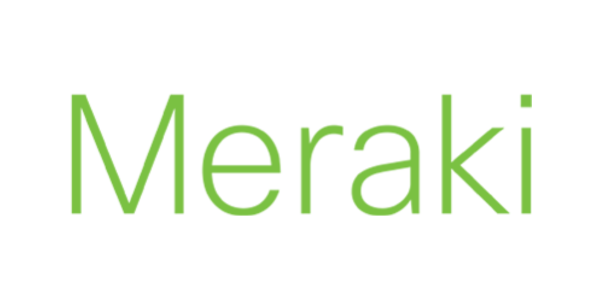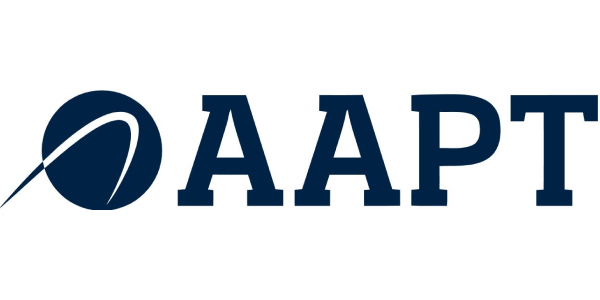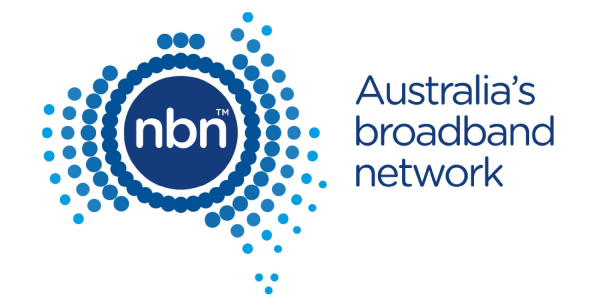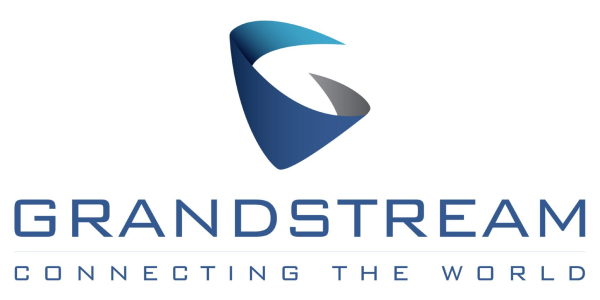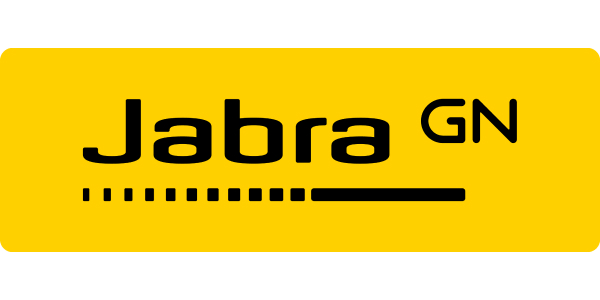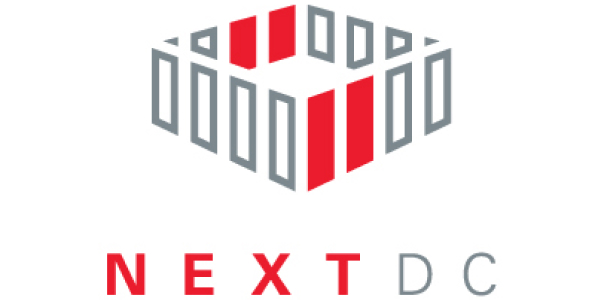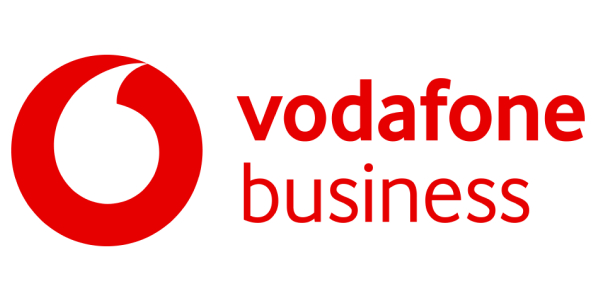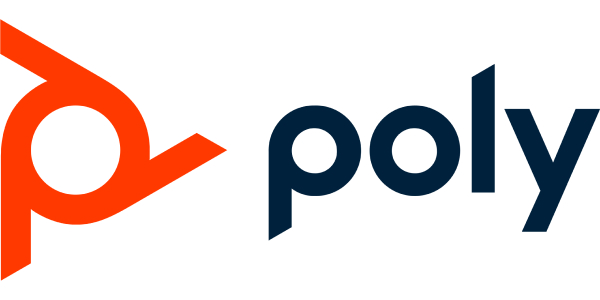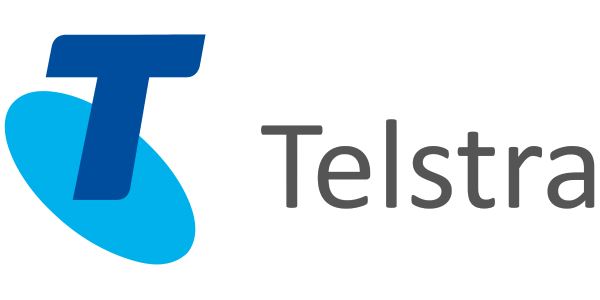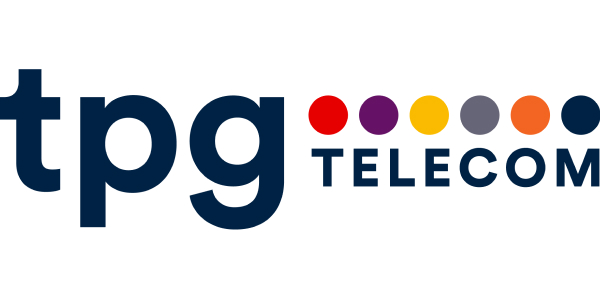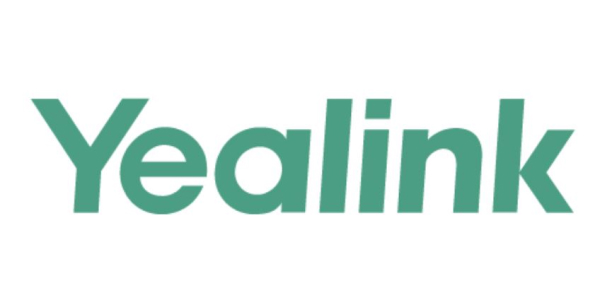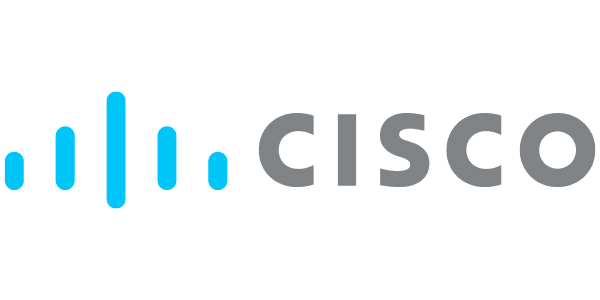Free Promotion
$0 nbn upgrade to full fibre (FTTP) for your nbn connection
Promotion upgrade applies to new nbn services or your current service
Elevate your business to new heights with a complimentary Full Fibre upgrade.
Moving from Fibre to the Node (FTTN) or Fibre to the Curb (FTTC) to the more advanced Fibre to the Premises (FTTP) not only prepares your business for the digital challenges ahead but also delivers a smooth, high-speed internet experience crucial for the modern digital landscape.
Experience near-gigabit speeds, lower latency, and steady performance, enabling your business to excel in real-time activities, including flawless 4K video streaming, effective cloud computing, and seamless online transactions.
What is the NBN (nbn™ network)?
The NBN stands for the National Broadband Network (nbn™ network).
It’s a national initiative designed to enhance and provide faster internet access and connectivity for Australians.
This network incorporates a multitechnology mix (MTM) strategy, combining various technologies like fibre optic cables, copper wire, pay TV networks, fixed wireless, and satellite services to cater to different regions and premises.
Benefits of Business nbn™ plans
Business nbn™ Internet Plans
Speedy
50 Mbps / 20 Mbps
Business nbn™
Minimum cost over 12-months $1,193 including $125 setup, or $2,136 over 24-months with $0 setup.
Suitable for:
- Businesses up to 5 users
- Browsing the web
- Streaming videos
- Video calls & conferencing
- 5 VoIP lines in your office
- Facilitates VPN for remote worker
Fast
100 Mbps / 40 Mbps
Business nbn™
Minimum cost over 12-months $1,193 including $125 setup, or $2,136 over 24-months with $0 setup.
Suitable for:
- Businesses up to 10 users
- Cloud-based apps & services
- 4K video streaming
- Video calls & conferencing
- 10+ VoIP lines in your office
- Uploading & downloading large files
- Facilitates VPN for remote workers
Super-fast
250 Mbps / 25 Mbps
Business nbn™
Minimum cost over 12-months $1,193 including $125 setup, or $2,856 over 24-months with $0 setup.
Suitable for:
- Businesses with up to 15 users
- Multiple users can be streaming
- Cloud-based apps & services
- 4K video streaming
- Video calls & conferencing
- 15+ VoIP lines in your office
- Uploading & downloading large files
- Facilitates VPN for remote workers
Ultra-fast
250 Mbps / 100 Mbps
Business nbn™
Minimum cost over 12-months $2,513 including $125 setup, or $4,776 over 24-months with $0 setup.
Suitable for:
- Businesses with up to 25+ users
- Cloud-based apps & services
- 8K video streaming
- Video calls & conferencing
- 25+ VoIP lines in your office
- Uploading & downloading large files
- Facilitates VPN for remote workers
Ultimate
500 Mbps / 200 Mbps
Business nbn™
Minimum cost over 12-months $3,233 including $125 setup, or $6,216 over 24-months with $0 setup.
Suitable for:
- Businesses with up to 50+ users
- Cloud-based apps & services
- 8K video streaming
- Video calls & conferencing
- 50+ VoIP lines in your office
- Uploading & downloading large files
- Facilitates VPN for remote workers
Lightning
1000 Mbps / 400 Mbps
Business nbn™
Minimum cost over 12-months $4,553 including $125 setup, or $8,856 over 24-months with $0 setup.
Suitable for:
- Businesses with up to 100+ users
- Cloud-based apps & services
- 8K video streaming
- Video calls & conferencing
- 100+ VoIP lines in your office
- Uploading & downloading large files
- Facilitates VPN for remote workers
Generally, the speeds you encounter may be lower than the maximum speed offered by your plan due to numerous reasons. Average Business Hours Speed: This represents the usual download speed you might see from 9am to 5pm. It’s not a guaranteed minimum speed, and speeds may drop below this level during these hours and at other times. Several factors, including the type of technology, your selected plan, and overall internet traffic, can influence speed variations. If your business Internet is mission critical, we recommend that you consider our higher class of services such as our NBN-EE (nbn™ Enterprise Ethernet) and our Enterprise Fast Fibre services.
Business nbn™ connection types
This is how the nbn™ network connects their technology to your site
Fibre to the Premise (FTTP)
A FTTP connection is when Fibre optic cables connect your premises to the NBN network.
Using FTTP provides the highest speeds (with speeds up to 1,000 Mbps) and most reliable service – it’s the gold standard for these types of NBN services.
The connection cables can either travel above the ground or below the ground.
Fibre is run into the premises and connected to a Network Termination Device (NTD). The NTD will be supplied by the NBN network and installed by an approved NBN network installer.
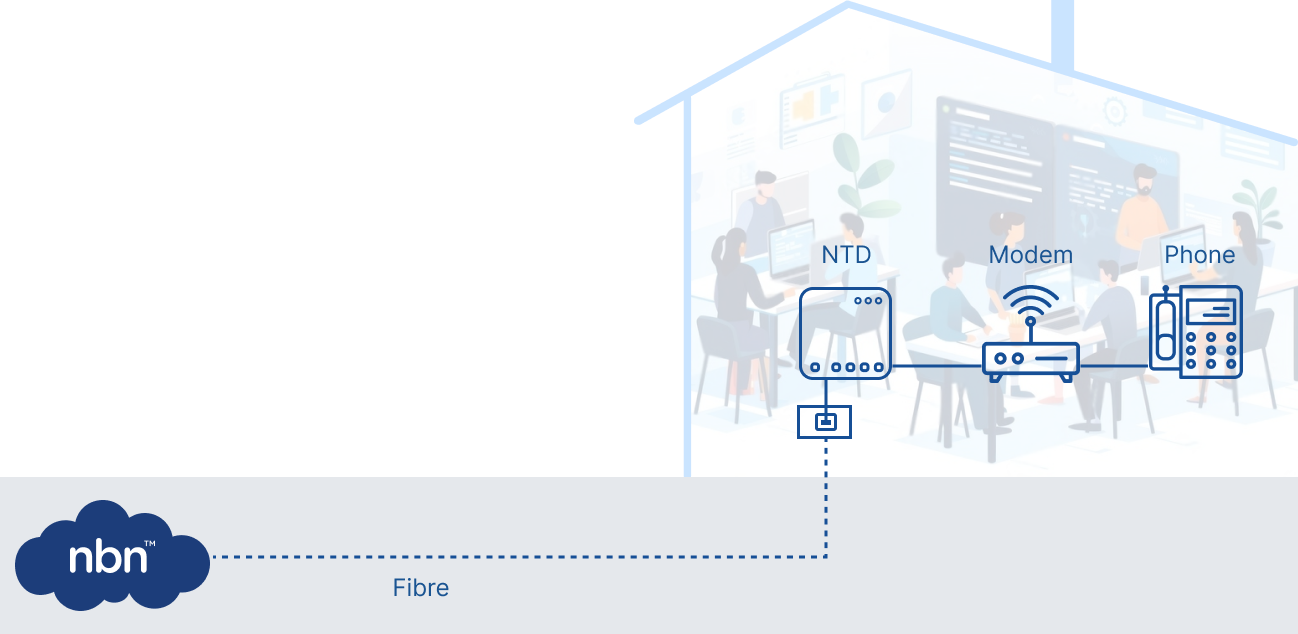
Fibre to the Node (FTTN)
An FTTN connection is when fibre is connected to a node that converts the NBN network optical network signal to be compatible with the existing copper network.
The speed you’ll experience depends on your distance from the node.
It’s a more budget-friendly option but can offer inconsistent speeds, especially during peak hours.
The node is installed by the NBN network.
The node needs to be reasonably close to the site premises, so the copper length is kept as short as possible.
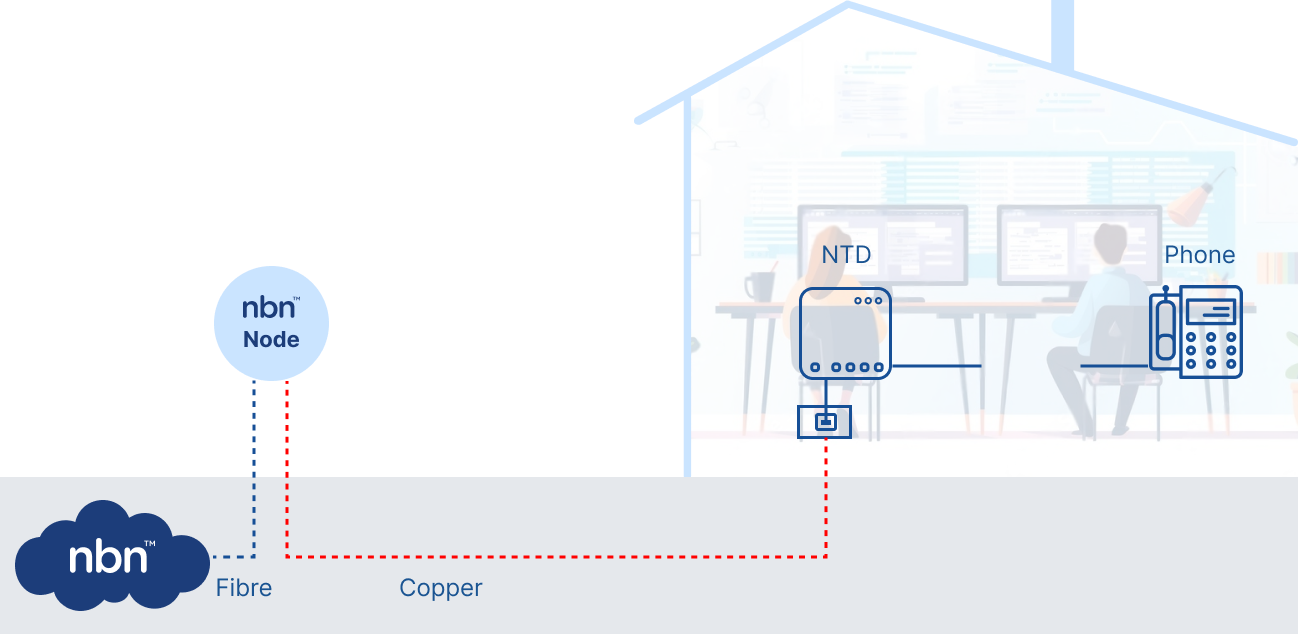
Fibre to the Building (FTTB)
An FTTB connection is when fibre is installed to a building or business centre. Speeds can vary based on the building’s internal wiring, making it a bit of a wildcard in terms of performance.
Fibre is connected to a node that converts the NBN network optical network signal to be compatible with the existing copper network and extends the service to all sites or offices.
This is the same as a FTTN service except the node is located within the building usually housed in cabinet located in the basement or communications cabinet.
Fibre to the building (FTTB) is also known as Fibre to the basement.
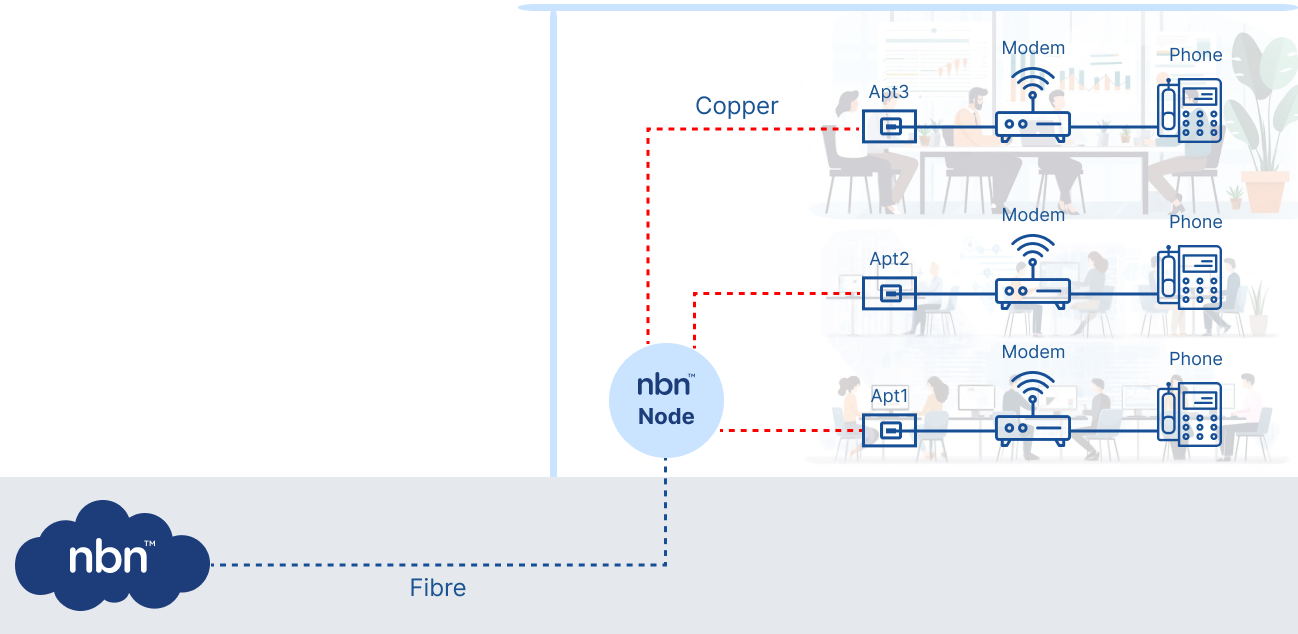
Fibre to the Curb (FTTC)
An FTTC connection offers more consistent speeds compared to FTTN and is generally easier to upgrade to higher speeds in the future.
FTTC connection is when fibre is extended close to the premises, connecting to a small Distribution Point Unit (DPU), generally located inside a pit on the street or on a nearby pole.
From here, the existing copper network is connected to the fibre to form the final connection. FTTC utilises VDSL2 (Very-high-bit-rate Digital Subscriber Line) technology.
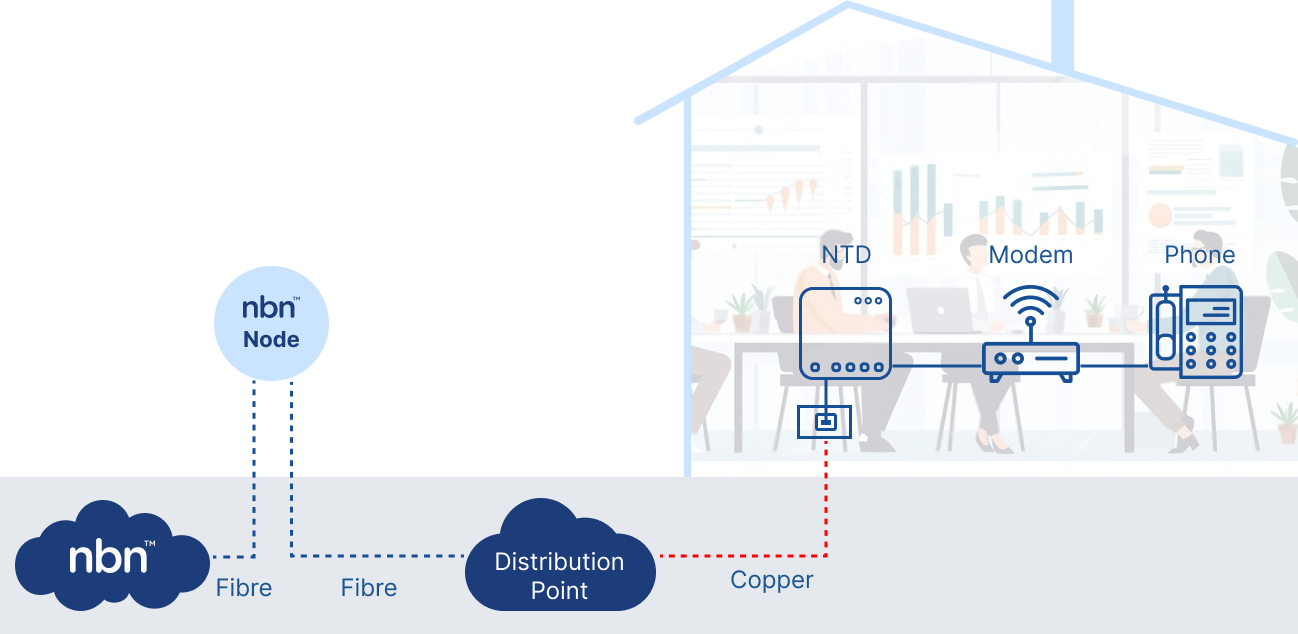
Hybrid Fibre Coaxial (HFC)
An Hybrid Fibre Coaxial (HFC) connection is a network technology developed by the cable TV industry that allows two-way, high-speed broadband content (video, voice and data) to be delivered to the premises using a combination of fibre and Pay TV coaxial cable.
It can be used by those who require high-speed internet but don’t have access to FTTP. Speeds can go up to 250 Mbps.
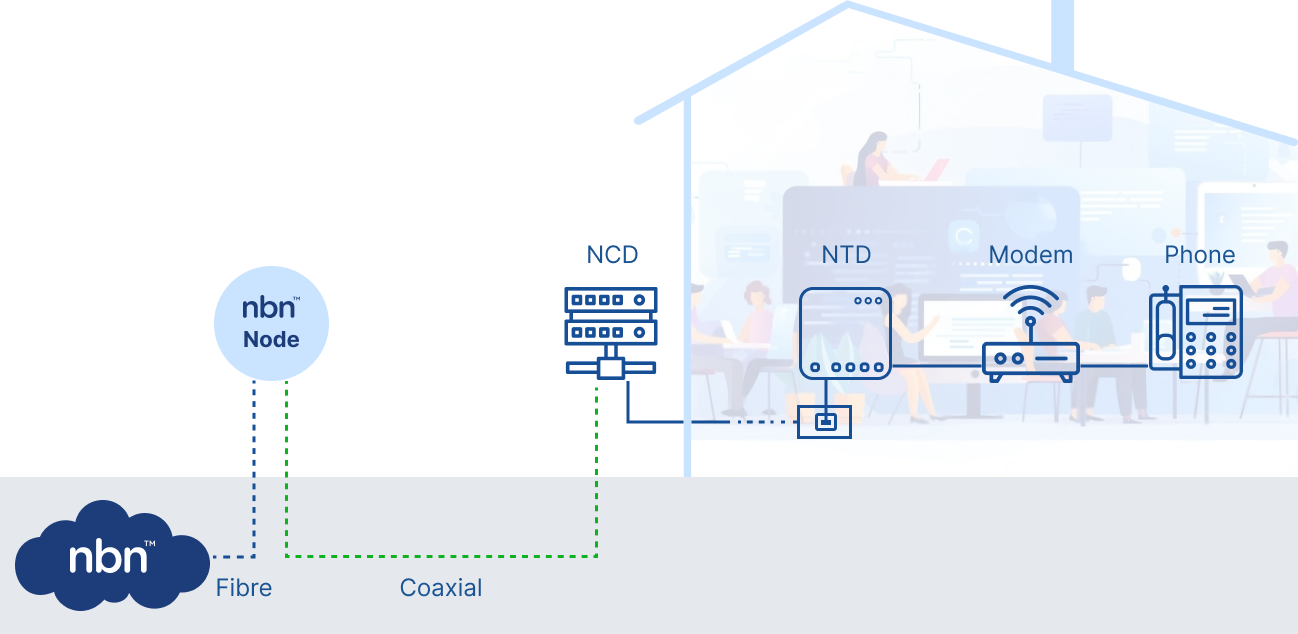
Fixed wireless (FW)
An FW connection is when most of the NBN journey is along fibre optic cables, with the final leg reaching the end user through a wireless signal sent from a transmission tower in the end users’ area.
This connects to an aerial (outdoor unit) on the end user’s roof which then terminates at an NTD inside.
Often this is the only options for those in rural and remote areas. While they offer limited plans and slower speeds, they are crucial for providing internet access to regions that other technologies can’t reach.
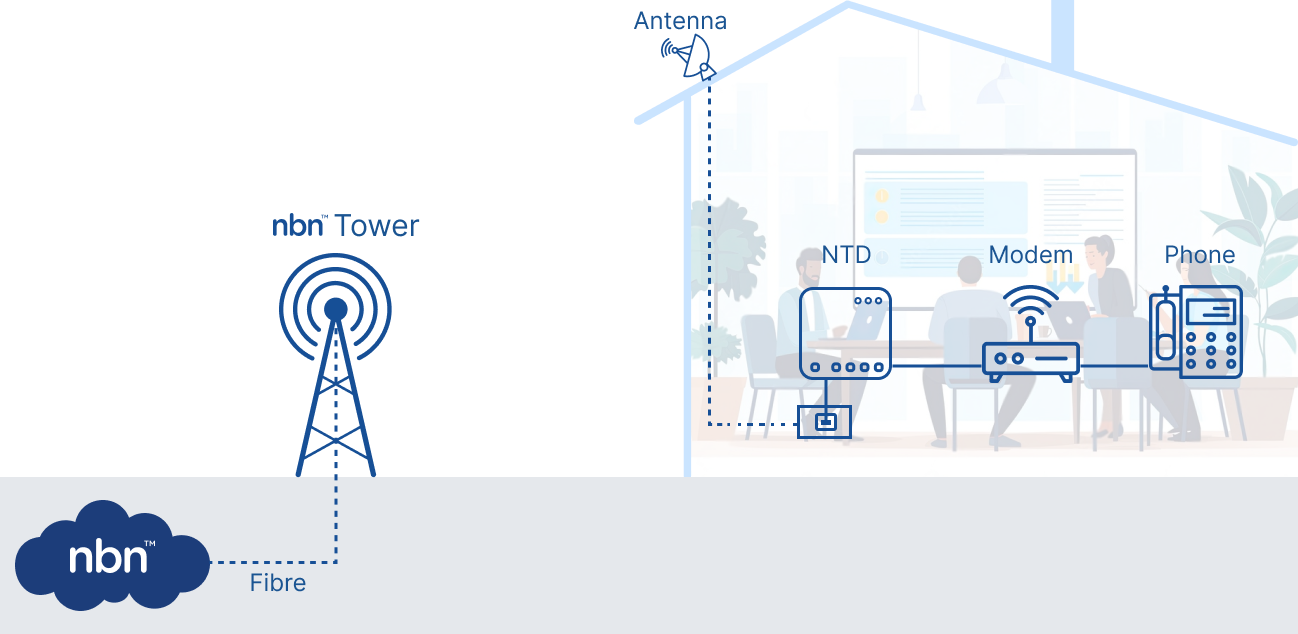
Why Choose Us
Choosing Voice Connect gives your business an advantage. It’s also smart as you will be accessing ‘best of bread’ carrier services and products. This in turn makes your business more efficient and productive.
Now that’s Simply Better Business.
3 Simple steps to get your site up and running
Embark on a seamless transition to our services with our hassle-free installation process, expertly coordinated by our dedicated team of experienced technicians. We prioritize your convenience, ensuring a smooth onboarding experience as you step into a world of reliable and tailored telecommunications solutions.


